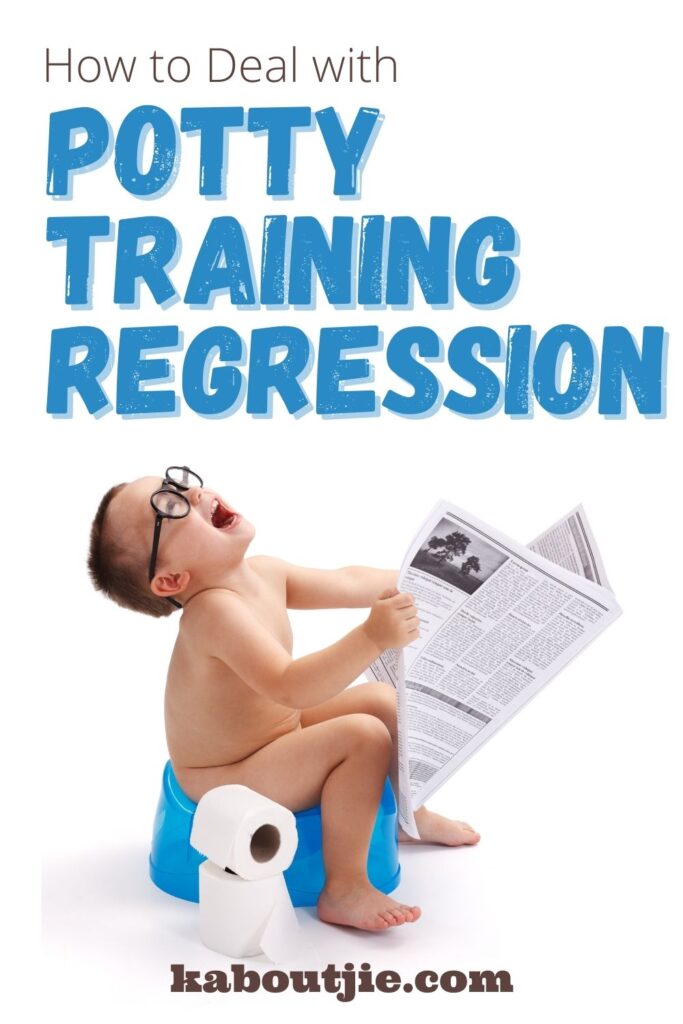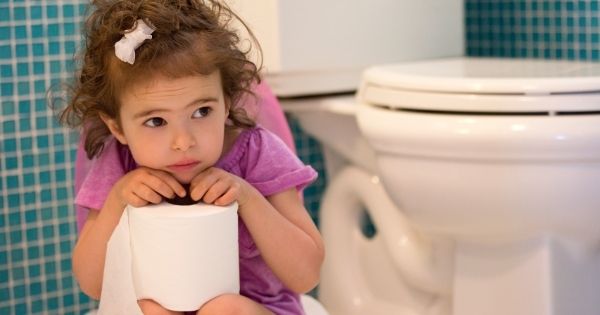Potty training isn’t a linear process. In fact, most toddlers will experience an obstacle or two that set them back. It’s normal to feel frustration when your child has accidents. But take a deep breath and remain calm. It’s important to remember that it happens to many kids and it won’t last forever. Eventually, your child will be potty trained!
To keep your child on the right track, here are some of the most common causes for potty training regression and the best ways to handle them. With patience, a regular schedule and setting up rewards, you’ll find your child will be progressing again in no time.

3 Common Causes for Potty Training Regression
-
Being Distracted
Sometimes not wanting to use the toilet stems from just being distracted. Whether it’s playing with toys or doing another fun activity, your child might not want to stop what they’re doing. Or they might put off their bathroom trip so long that they have an accident, because they couldn’t make it in time.
-
Experiencing Stress or Other Emotions
As an adult, stress can give you a headache or make you feel exhausted. As a toddler, it can interfere with potty training. Any time there’s a change in your child’s life, it can cause stress.
Some stressful situations include:
- Having an accident in public
- Moving to a new house
- Adding a new baby to the family
- Experiencing divorce
- Going to school for the first time
- Getting a new teacher or switching to a different classroom
-
Feeling Constipated or Having Other Digestive Issues
If your child feels constipated or has recently experienced other digestive problems, going to the bathroom can be an unpleasant experience. And it may make them feel hesitant about using the toilet.
Make sure he or she drinks plenty of water and eats fiber-rich foods like fruits, vegetables and whole grains. Peaches, pears and prunes can be helpful. And a good amount of active playing, like running around at the park, can also be especially beneficial.
If your child struggles with constipation, try changing their diet. Here are some foods to avoid:
- Foods high in sugar
- Foods rich in simple carbohydrates, like white bread, pasta and rice
- Bananas
- Dairy

4 Ways to Overcome Potty Training Regression
It’s best to talk to your pediatrician if your child is struggling with ongoing constipation or other internal issues. Once it’s easier for your child to go, it’s easier for them to stay on track with potty training.
If your child’s potty training regression is linked to stress or life changes, there are a few simple ways you can help keep him or her on track.
-
Be Patient and Understanding When Accidents Happen
Shaming or embarrassing your child when accidents happen isn’t a good way to deal with it. In fact, it can make things worse. When an accident happens, remain calm and don’t punish your child.
Overreacting and other negative responses won’t help you or your child in the long run. Even when you’re dealing with accidents, you’ll want to avoid switching back to diapers or pull-ups, since this can cause embarrassment.
It’s important to keep in mind that your child isn’t having accidents on purpose to be difficult. It just takes time and positive reinforcement to transition from using a diaper to using the toilet.
-
Set Up a Schedule for Potty Times
Putting your child on a regular potty time schedule will help keep them on track. Here’s how you can put one together:
- Have your child try to go every couple of hours, including after getting up for the day or following meals. Holding it for too long can cause health problems and make them even more fearful of using the toilet, setting up a frustrating cycle that can be tough to break quickly.
- Have them sit on the potty for several minutes, even if they say they don’t need to go.
- If your child is struggling with a bowel movement, don’t force it. Have them drink water and eat a piece of fruit before trying again in a little bit.
- Be positive and praise them even if they don’t go. Rewards and positive reinforcement go a long way when you’re working on potty training.
- Be aware of your child’s signals, like facial expressions, that they need to go, and get them to the toilet quickly.
There’s one other catastrophe that you can easily avoid during the potty training process. Some families like to use flushable wipes, but it’s important to know that these wipes shouldn’t be flushed.
Studies have shown that although these wipes are called “flushable,” they don’t dissolve like toilet paper. Professional plumbers recommend that you never drop those into your toilet. So, it’s best to throw them away instead. Disposing of them properly will help you avoid clogs and backups in your toilet and sewer line.
-
Read About It Together
Reading to your child has many benefits, like boosting their vocabulary, increasing brain development and getting them ready for school. It can also help reinforce positive behaviors, like potty training. Some of the most-recommended picture books include:
- Potty Time with Elmo
- Everyone Poops
- Once Upon a Potty
- Time to Pee!
- A Potty for Me
-
Establish Rewards
Children are motivated by rewards and setting up a simple system can be helpful when you’re dealing with potty training regression. You can use little, inexpensive rewards, like a chart with stickers to track no-accident days.
When your child does something good in the potty training process, make sure to make a big deal out of it so he or she will want to do it again.
Be Patient and Trust the Process
When you’re potty training your child, it’s important to be patient and trust the process, which can take longer than you expect. Regressions are a part of life and will happen, but eventually your child will be potty trained!
 Kaboutjie SA Mommy Blogs by Lynne Huysamen
Kaboutjie SA Mommy Blogs by Lynne Huysamen





This post was certainly helpful and has some good tips great job
Thank you for inspiring us daily💜reading about breastfeeding and potty etc are things that I struggled with as a first time Mom, but thank God with help nd beautiful posts like these we won the battle😊
For me is so challanging with this potty train my boy turning 3 this year june and he do everyday accidents and say afterwards he is done pee and some days he dont really want to be on a potty is really tough
Starting with potty training soon. Any suggestions for Afrikaans books to read to my child about using the toilet?
You can get this one free on Kindle from Amazon!
Very helpful post :). My 2year old has is already potty training and loving it. Some days it’s still a struggle but she’s getting the hang of it 🙂
Starting with my little girls potty training adventure soon… Great read. 😊
This was a very helpful blog post. I am definitely going to try out these tips on my 2 year old 🙂
Thank you for the tips. This article was helpful as I’m going to start potty training after my son turns 2 in February.
Thank you for the amazing advice. Definitely explains a lot.
Thank you for the tips.they are really helpful
Q: is 18 months too early for a child to start putting training? My 18 month old is already showing signs of readiness
18 months is a great age if they are showing readiness!
Thank you for your tips.
Potty training definitely not for the feint hearted. Can go one of two ways. I was fortunate enough to have both easy
Such a helpful post as my previous potty training was 5 years ago 🙈
Thank you for all these helpful tips!
Thank you for all great tips .